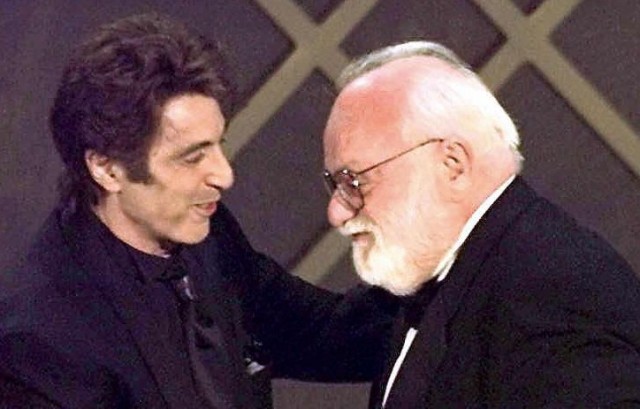In 1955, Zaentz went to work for Fantasy Records, a jazz and comedy label founded by the brothers Max and Sol Weiss in San Francisco in 1949. He ended up buying the company with a group of investors in 1967. It went on to become the largest jazz record label in the world.
Fantasy had signed a single rock band, The Golliwogs, led by a Fantasy shipping clerk, John Fogerty, according to the San Francisco Chronicle. The group rechristened itself Creedence Clearwater Revival and went on to sell 5 million albums.
Creedence was “a lightning strike,” Zaentz told the Chronicle in 1970. “If we ever find another group that sells half as much, we’ll be delirious.”
Zaentz and Fogerty later battled numerous times in court. Their relations grew so strained that in 1985 Fogerty wrote a song called “Zanz Kant Danz.” One of the lyrics: “Watch him or he’ll rob you blind.” Zaentz, who was famously litigious, alleged that the song defamed him, and Fogerty changed the title to “Vanz Kant Danz.” Zaentz then sued Fogerty for plagiarizing Creedence songs on a later solo album; Fogerty prevailed and won attorney’s fees in a case that went all the way to the U.S. Supreme Court.
Zaentz formed The Saul Zaentz Co. in 1972 and moved into film production with the 1975 film “One Flew Over the Cuckoo’s Nest,” based on the novel by Ken Kesey. It won a best picture award and Oscars for director Milos Forman and its stars, Jack Nicholson and Louise Fletcher.
His 1984 effort, “Amadeus,” won eight Oscars, including best picture, best director (Forman again) and best actor (F. Murray Abraham). Other successful films included “The Unbearable Lightness of Being,” with Daniel Day-Lewis and Juliette Binoche, and The English Patient, with Ralph Fiennes and Kristen Scott Thomas. That film won best picture and best director.
Zaentz, who was a big reader and got most of his film material from novels, obtained the rights to J.R.R. Tolkien’s “Lord of the Rings” trilogy and “The Hobbit.” He made an animated version of “Lord of the Rings” in 1978, but sold the film rights to Miramax in 1997. Director Peter Jackson took the project to New Line Cinema after Miramax could not fund it, and the franchise went on to earn more than $2.9 billion. Zaentz twice sued New Line, according to Variety magazine. The case was settled out of court in 2005.
The academy awarded Zaentz the Irving G. Thalberg Award in 1997.
In 1969, Fantasy Records purchased a property on Tenth and Parker streets in Berkeley from the Peterson Trucking Co.. The record company moved into a two-story building in 1971. The financial success of “One Flew Over the Cuckoo’s Nest” enabled Zaentz in 1980 to add a new seven-story building that has since become one of the defining features of West Berkeley’s skyline. The new structure contained a fully equipped dubbing stage, and picture and sound editing suites. Zaentz added a second film-mixing stage and additional editing rooms in 1989.
The building became known as the Zaentz Media Center and was used by filmmakers and musicians from around the world. Numerous successful albums were recorded there, including Green Day’s “Dookie” in 1994 and Santana’s “Supernatural” in 1999. The latter went 15 times platinum and garnered nine Grammy Awards.
Zaentz is survived by four children, Dorian, Joshua, Athena, Jonnie; a nephew, Paul Zaentz, who is also a producer; and seven grandchildren.
KQED News Associate Berkeleyside is an independently owned news website based in Berkeley, Calif. Click here if you would like to receive the latest Berkeley news in your inbox once a day for free with Berkeleyside’s Daily Briefing email.

